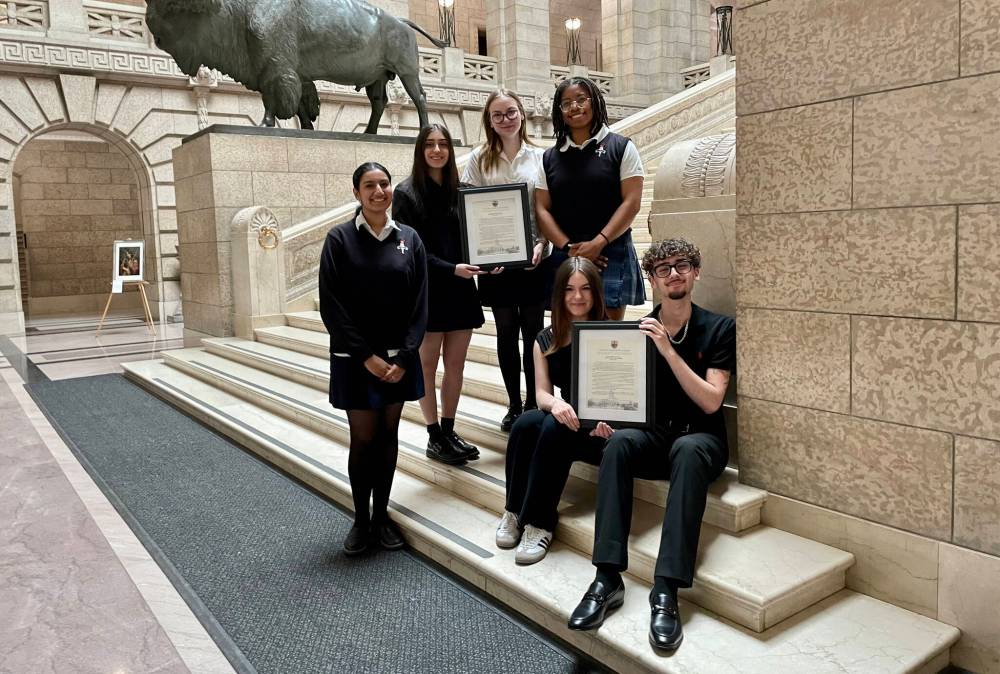Council of River Heights students has cabinet minister’s ear on value of AI, other tech in education
Advertisement
Read this article for free:
or
Already have an account? Log in here »
To continue reading, please subscribe:
Monthly Digital Subscription
$0 for the first 4 weeks*
- Enjoy unlimited reading on winnipegfreepress.com
- Read the E-Edition, our digital replica newspaper
- Access News Break, our award-winning app
- Play interactive puzzles
*No charge for 4 weeks then price increases to the regular rate of $19.00 plus GST every four weeks. Offer available to new and qualified returning subscribers only. Cancel any time.
Monthly Digital Subscription
$4.75/week*
- Enjoy unlimited reading on winnipegfreepress.com
- Read the E-Edition, our digital replica newspaper
- Access News Break, our award-winning app
- Play interactive puzzles
*Billed as $19 plus GST every four weeks. Cancel any time.
To continue reading, please subscribe:
Add Free Press access to your Brandon Sun subscription for only an additional
$1 for the first 4 weeks*
*Your next subscription payment will increase by $1.00 and you will be charged $16.99 plus GST for four weeks. After four weeks, your payment will increase to $23.99 plus GST every four weeks.
Read unlimited articles for free today:
or
Already have an account? Log in here »
River Heights teens want their high schools to embrace technology — the possibilities of artificial intelligence, in particular — rather than ban it.
Grade 11 student Salina Lupu uses AI-powered chatbots to help her strategize how best to manage her time when she’s working on a major project.
Matias Lastra, 17, keeps these tools in his back pocket when he needs to break down a complex math equation or the process to solve it.

MAGGIE MACINTOSH / FREE PRESS
St. Mary’s Academy students (from left to right) Anureet Chaudhary, Diana Bonakdar, Nadia Lovallo and Chinanuokum Onyiuke and Kelvin High School’s Salina Lupu and Matias Lastra (both seated) met at the Manitoba legislature this week as part of the newly formed River Heights inter-school council.
The new Kelvin High School student council co-presidents shared how they’re using the technology to do their homework with government officials this week.
“(AI) can be a really helpful tool if used properly and if we’re taught how-to use it properly,” Salina said.
Mike Moroz, Manitoba’s minister of innovation and new technology, has created an inter-school council to hash out policies on AI and other issues affecting students.
The MLA for River Heights has begun inviting public and private school students from his constituency to meet at the legislature on a semi-regular basis.
“Kids don’t get the credit they deserve for how much they think about the world around them,” said Moroz, who taught high school drama and humanities before he ran for public office in 2023.
Kelvin, Gray Academy, Grant Park High School and St. Mary’s Academy make up his newly formed council.
Moroz said it is “critically important” that students from these schools understand their voices have value and the government provides a microphone.
Technology, affordable housing and environmental and social justice issues are among the topics they’ve discussed to date, he said.
On Monday, the last day of the spring legislative session, a half-dozen students gathered at 450 Broadway for the council’s second official meeting.
Student leaders found common ground related to their thoughts on the growing role of smartphones and AI in education and how the technologies are viewed by adults around them.
The Manitoba government banned the use of cellphones during classes, except when teachers approve their use for educational or inclusion purposes, at the start of the 2024-2025 school year.
“It’s difficult to ban technology when we require it,” said Chinanuokum Onyiuke, a Grade 12 student at St. Mary’s.
The 18-year-old noted screens have been deeply embedded into her school experience.
“We use Teams every single day,” she said.
Many teachers across the province use Microsoft Teams as a virtual extension of their classroom. Students can send messages and upload assignments to the software program via phones, tablets and laptops.
Members of the River Heights inter-school council acknowledged their teachers are grappling with how to police phone usage and AI-related plagiarism, but they said outlawing the tools is not the answer.
“There’s a lot of fear from the educators’ side because they don’t know how to approach this and they’re thinking of (technology) more as a threat to our education than a resource,” said Diana Bonakdar, 16.
The St. Mary’s Grade 11 student said she told Moroz about the need “to shift our mindset” to view AI as a tool that can speed up processes rather than something to be feared.
Moroz is planning to have students get together about once every two months throughout the rest of his term.
The setup is unique in that some participants rarely mingle — despite attending schools across the street from one another, in the case of Kelvin and St. Mary’s.
Manitoba Education runs a separate student advisory council. It consists of 30 high school students from campuses across Manitoba.
maggie.macintosh@freepress.mb.ca

Maggie Macintosh
Education reporter
Maggie Macintosh reports on education for the Free Press. Originally from Hamilton, Ont., she first reported for the Free Press in 2017. Read more about Maggie.
Funding for the Free Press education reporter comes from the Government of Canada through the Local Journalism Initiative.
Every piece of reporting Maggie produces is reviewed by an editing team before it is posted online or published in print — part of the Free Press‘s tradition, since 1872, of producing reliable independent journalism. Read more about Free Press’s history and mandate, and learn how our newsroom operates.
Our newsroom depends on a growing audience of readers to power our journalism. If you are not a paid reader, please consider becoming a subscriber.
Our newsroom depends on its audience of readers to power our journalism. Thank you for your support.
History
Updated on Wednesday, June 4, 2025 3:01 PM CDT: Adds photo



